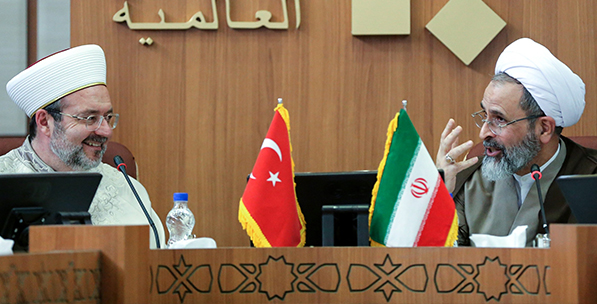The geostrategic rift between Iran and Saudi Arabia, which has been brewing amid numerous proxy wars across the Middle East and North Africa over the course of recent years, came to a tipping point with the execution of Shiite cleric Nimr Baqir al-Nimr last week. Al-Nimr was a truly symbolic figure who represented radical Shiite opposition to the Saudi monarchy on its home soil; therefore his incarceration following the initial days of the Arab Spring was an instinctive move for survival in terms of the royal family. Yet the timing chosen by Riyadh for his execution, along with 46 suspects associated with al-Qaida, deserves careful evaluation. Leaving aside the rhetoric of the Shiite/Salafi divide based on theological/ideational differences, what we are observing is the rapid escalation of a dangerous geopolitical confrontation - or turf war - between Iran and Saudi Arabia with crucial regional, and potentially global, repercussions.
Iran's intention to abuse the nuclear deal and rapprochement from the West, as well as its military alliance with Russia in Syria to maximize its claim for regional dominance in the Middle East seems to have reached its limit. Following the galvanization of its dominance over the central government in Iraq; proxy control over Lebanon through Hezbollah; cooperation with Bashar Assad's para-military forces known as the Shabbiha and Russian air forces in Syria, Iran felt confident enough to get more actively involved in the Yemeni civil war on the side of the Houthis and meddle with domestic politics of the monarchies in the Gulf.
The Saudis were already involved in numerous proxy wars against Iran, but the prospects of domestic strife in the kingdom, as well as neighboring monarchies with substantial Shiite populations such as Bahrain, Kuwait, and United Arab Emirates might have motivated the preemptive move via al-Nimr's execution. Economically, declining global oil prices created grave financial difficulties for major oil exporters in the Middle East that do not have ample options for industrial diversification. The fact that Saudi Arabia had a budget deficit last year to the tune of $100 billion and was warned by the IMF that unless radical reforms were made, its economy might collapse in five years, proves the point. From a political economy perspective, it does not require tremendous expertise to predict that declining revenues for the Gulf States will weaken the traditional "rentier networks" formed to purchase popular consent with distributive packages, and make them more vulnerable to political destabilization through external meddling.
This takes us to Turkey's respective geopolitical positioning with respect to the Saudi-Iranian rift in an extremely sensitive regional system. For Ankara, diplomatic convention requires it to follow a neutral path between two Muslim countries and regional powers that are involved in a tit-for-tat confrontation with potential repercussions of direct military conflict. But it is no secret that Turkey is extremely disturbed by Iran's duplicity when it comes to the future of Syria and the region in general, as well as the domestic sensitivities of Turkish politics such as the Kurdish issue. Having taken the lead in the integration of Iran into the international system with the Tehran Agreement just a few years back and having seen Tehran's growing regional ambitions via proxy wars, Ankara rightly sees no future national interest in systematically cooperating with the Iranian regime.
Saudi Arabia, Turkey, Iran and Egypt are conventionally accepted as the major players in the constantly shifting geopolitical theatre of the Middle East. Turkey's regional foreign policy options in the medium term are likely to be determined in a way that gives more weight to cooperation with Saudi Arabia and Egypt (with which a normalization might be in the cards) and possibly Israel (via another process of normalization) at the expense of Iran in order to produce a more balanced mix of alignments. Obviously this does not mean to approve every tactical move that the Saudis will make to punish Iran in regional conflicts; but it is more likely that Ankara will strengthen its strategic alliance with Riyadh and will be more vocal against Tehran's provocative steps.
[Daily Sabah, January 8, 2016]






